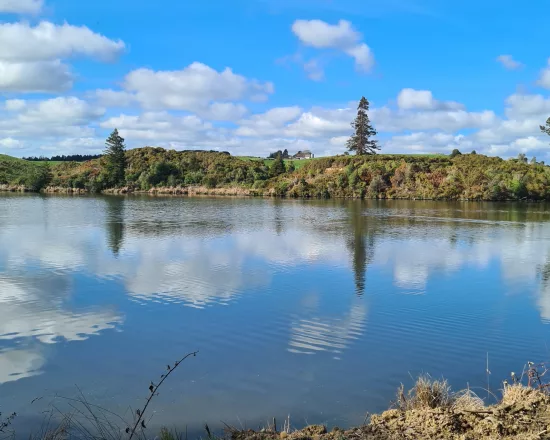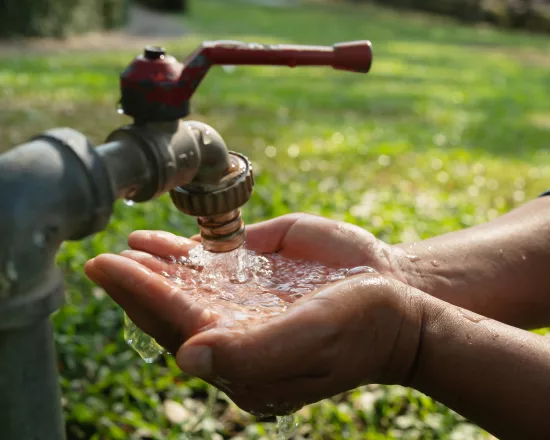Affordable Waters Reforms (formerly Three Waters Reform)
The Three Waters Reform was launched by the Central Government to change the way that drinking water, wastewater and stormwater (the three waters) are managed and delivered to the community.
In Rangitīkei, these three services are currently delivered by Manawatū District Council under a shared services agreement with Rangitīkei District Council and are funded through rates.
Originally Central Government had proposed that there would be four new entities created under the reform that would take control of drinking water, wastewater and stormwater across New Zealand. Rangitīkei would have been included in the Western-Central Water Services Entity area, which covered councils in the Bay of Plenty, Waikato, Taranaki and the northern part of Horizons region.
In April 2023, the Government announced that the four entities would become 10 entities, with their boundaries established roughly along the lines of New Zealand’s regional councils. The ten entities will allow local councils more direct engagement with the water entities that will manage water services on their behalf. The Three Waters Reform was also renamed as the ‘Affordable Waters Reforms’.
What will this mean for our District?
When the Reform is complete, Council will no longer deliver drinking water, wastewater and stormwater services to the community. Instead, these services in Rangitīkei will be managed by one of the ten entities created - Entity E - which covers the Manawatū-Whanganui region. This would include Rangitīkei together with Palmerston North, Whanganui, Manawatū, Horowhenua, Ruapehu, and Tararua. Although having a regulatory role, Horizons Regional Council does not deliver water services so remains outside Entity E.
All of Council’s water assets and associated debt will transfer to Entity E. Rangitīkei (together with other councils in the Entity E area) will co-own the entity in shares allocated on a population basis. These shares do not confer any decision-making rights so Council won’t have direct control over the Entity.
Instead, our main role as a Council will be through membership (by the Mayor or their nominee) of the Regional Representative Group to represent the communities in Rangitīkei to ensure the Entity meets their needs. There will also be an Iwi representative for each district. They appoint the board of directors for the Entity, participate in setting the Entity’s strategic direction, review the Entity’s performance and approve the Entity’s appointment and remuneration policy.
One consequence of the April 2023 announcement is the withdrawal of the intended second tranche of ‘Better-off’ funding, intended to allow councils to improve community well-being. Rangitīkei would have received $9.9 million (in addition to the $3.3 million already approved under the first tranche). This second tranche was to have been funded by the water services entities rather than the Government, but will now no longer be offered.
Why is the Government doing this?
The Government accepted concerns expressed by local government leaders that the four-entity model did not give sufficient opportunity for local concerns to be raised and addressed by these entities.
The Government’s position is that the new Entity will be allowed to borrow more money and have higher debt levels than councils are allowed - this will reduce the cost to individual households.
What does Rangitīkei District Council think of the Reforms?
We understand and support the need for change to how water is managed and delivered in New Zealand, however, we, like nearly all Councils, had many concerns about the originally proposed Reform. We strongly voiced this to the Government primarily through submissions to Parliament on the various legislative proposals. Our Council submitted strongly to state the level of opposition to the reform proposals in our community and our concern whether the Minister’s assurances on the financial implications for individual consumers will be delivered.
Mayor Andy Watson’s statement on the April 2023 changes is as follows:
“Council still has a number of concerns around the revised Government position. Although having a direct voice for Rangitīkei is a significant step forward, decisions about our district will still be made elsewhere.
We’re still lacking detail around how the reforms will be put in place, what Councils’ roles will be and what the costs to our community from the Entity will be by way of their charges. Staff are unsure of their future and Council will need to understand how these reforms will alter our debt and rating positions for the future, along with many other issues."
What happens now?
These Reforms were originally planned to be implemented by 1 July 2024. Following the changes announced in April, implementation will be delayed. The 10 new entities will begin to be stood up from early 2025 in a staggered approach and this process will be completed by 1 July 2026 at the latest. The National Transition Unit within the Department of Internal Affairs will continue to manage the process. Legislation will be introduced into Parliament to provide for the new entity structure and new timeline.
On 25 May 2023, the Finance and Expenditure Committee is due to report back to Parliament on the Water Services Legislation Bill and the Water Services Economic Efficiency and Consumer Protection. These bills will then proceed through the remaining stages of consideration before being enacted.
We’re still awaiting the next steps, but we are committed to keeping our community informed as the reform develops.
Want more information?
If you have more questions, the Department of Internal Affairs website has more information.
Alternatively, an FAQ has been prepared by the Department of Internal Affairs that you can find here.
Timeline
| 2016 | Havelock North campylobacter outbreak in which thousands of people were infected by drinking water from contaminated bores – four people died, and others were left permanently disabled. |
| 2017 | Central Government inquiry into the Havelock North drinking-water contamination. |
| 2017-2019 | Central Government’s Three Waters Review. |
| Dec 2019-March 2021 | Taumata Arowai is set up as a Crown Entity to regulate drinking water from late 2021. |
| May 2020 | Three Waters Steering Committee set up to oversee the Three Waters Reform Programme. |
| July 2020 |
|
| Aug 2020 | Rangitīkei District Council signs the MoU with Central Government to supply detailed information on our current 3 waters infrastructure and operations to allow Central Government to explore water reform options. |
| Apr-June 2021 | Central Government makes more detailed decisions about the Three Waters Reform proposal including:
|
| Jun-ongoing | Central Government nationwide education campaign underway. |
| Aug-Sept 2021 |
|
| Oct-Dec 2021 | Central Government announces the reform will proceed and is compulsory. |
| June 2022 | Water Services Entity Bill is introduced into the House. |
| Sept 2022 | Rangitīkei District Council submits on the Water Services Entity Bill. |
| Nov 2022 | Changes are made to the Water Services Entity Bill. |
| Dec 2022 | New Zealand Government passes the Water Services Entity Bill. |
From early 2025 | New water entities will provide communities with three water services. |



